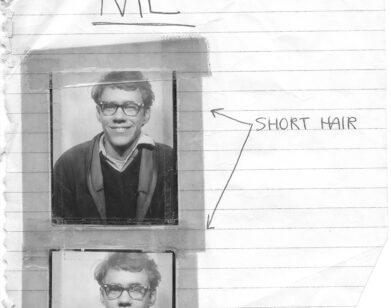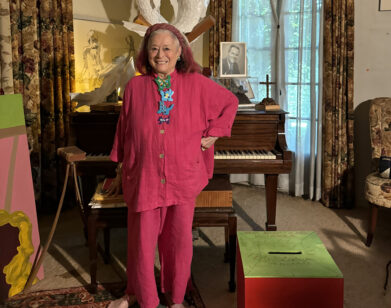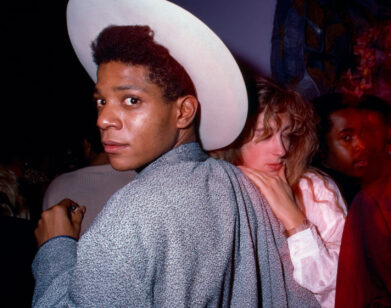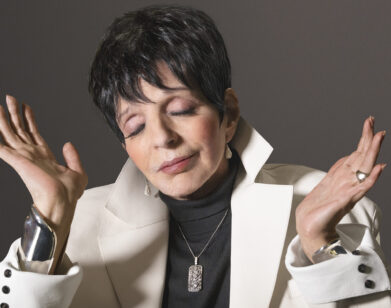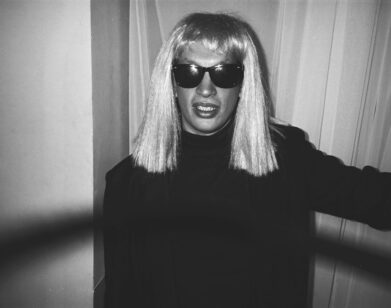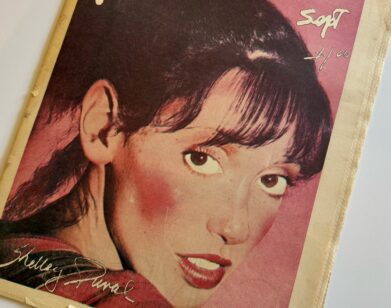Grace Jones: I don’t know anywhere to party in New York
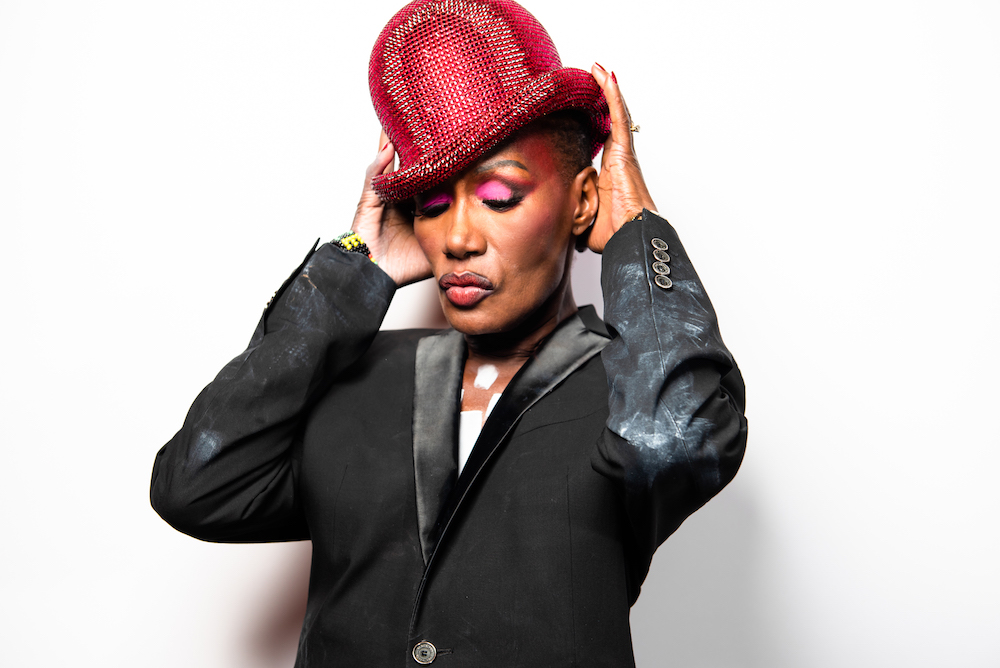
PHOTOS BY GRIFFIN LIPSON/BFA. COURTESY OF TIMESTALKS.
You’d think Grace Jones would be exhausted by now.
Singer, Bond girl, art muse, legend on the party circuit, mother, grandmother, and now the star of her own documentary—the 69-year-old has been unstoppable since her career took off in 1977 with her debut album, Portfolio.
When we got on the phone, Jones was gearing up for a TimesTalks Festival appearance celebrating the premiere of Grace Jones: Bloodlight and Bami on April 13. Nearly a decade in the making, it was directed by her friend Sophie Fiennes, and received heaps of praise after being screened at the Toronto International Film Festival last fall. And rightfully so: Fiennes moves beyond the diva persona Jones is often pigeon-holed into and presents a talented, three-dimensional female artist taking the stage, getting lonely, shucking oysters, and witnessing the birth of her granddaughter.
Her laugh is a throaty, inviting sound, in which you lose your sense of reality and quickly forget you’re talking to Grace Jones (and making Grace Jones laugh). Not only was she excited to continue her press tour—a daunting labor for many celebrities—but she was palpably piqued by the idea of partying in Brooklyn later (she agreed that Manhattan is over). It’s the kind of spirit possessed by artists on a higher plane of human existence, the ones with boundless energy, whose age you’re always surprised to hear, whose names transcend generations.
JANE GAYDUK: I was wondering, what does Bami mean to you?
GRACE JONES: It’s made from cassava and, for me, it has a lovely flavor because it’s not sugary. Normally when you order jerk chicken they ask if you want bami or vegetables. If you get vegetables it’s made out of corn meal, which is slightly sweeter. And I’ve always loved bami, from when I was very little, growing up [in Jamaica]. It just reminds me of Jamaica because it’s the only place I’ve ever eaten it. I’ve traveled many places and I’ve never had that anywhere else in the world, so when I go to Jamaica, I love to have that. I cannot find it anywhere else.
GAYDUK: What’s your favorite moment in the documentary?
JONES: Oh [laughs] I swear I don’t have one particular favorite moment. The one that makes me laugh a lot is opening the oyster … When my mom was singing was really special—it always makes my hair stand up—in the church. God there are so many moments. You know, the whole thing with the French TV reminded me a lot of how things can kind surprise me, shock me.
There’s nothing that I didn’t like. And I didn’t watch it before it was all edited, I just did not pay any attention to it at all until it was finished. There’s just so much in there: The part where my granddaughter was being born was also very special because I just happened to be there at that time. I didn’t go there specifically for that. So those are all magical moments.
GAYDUK: Was it difficult to give a camera crew so much access into your life?
JONES: Basically it was just Sophie. Sophie: a one woman show, you know? So we didn’t have a whole big crew following us, which was amazing.
GAYDUK: Are you guys also good friends?
JONES: Oh yeah, absolutely. We struck it off right from the moment we met.
GAYDUK: Was it like being with your friend for the last five years who happens to have a video camera?
JONES: Well yeah, she had directed a film on my brother and his church in Los Angeles called Hoover Street Revival—that’s how I met her—she invited me to the screening of that, and he spoke really [highly] of her. She felt like family immediately, and she did not really direct or say anything [while filming] so after a while you forgot she was there. And after a while you fully trust one another. I was more worried about my family being filmed than myself because they’re not used to it. I was much more used to it.
GAYDUK: There’s a moment in the trailer where you talk about the loneliness that you feel as a performer. Can you tell me a little bit about that?
JONES: It’s just one thing about you getting inside yourself, really. I shouldn’t really say loneliness because you’ve got all the audience out there and there you are; it’s only you. I don’t have a band to make up for me, it’s just me there. It’s do or die. I’ve come to terms with it because at the end of the day it’s more being alone than lonely. I probably should have said that, now that I think about it. You have to really go inside yourself.
GAYDUK: Is there a certain power that comes from that?
JONES: Well you don’t see anybody looking at you, I think that’s probably the feeling too of being more alone, because they’re in the dark basically and the lights are so bright on your eyes that you don’t see anyone. You feel them. Sometimes towards the end or during a song, I’ll ask that they turn the lights up on the audience. It’s interesting to flip the light onto them instead. The bigger the audience the more you don’t see them. It’s funny—performing for one or two people or 10 people is probably harder than performing for 50,000.
GAYDUK: Yeah I guess it’s a much more intimate thing, you feel much more connected.
JONES: Mhmm. And I do like the intimate. I don’t really care for performing for arenas. I do like the intimacy as well. So I guess the bigger the audience, the more alone you feel up there. But it’s not like you have the Spice Girls or a group where somebody else can take your place. It’s just you. It’s just me there. And as my catalog got bigger, there’s a lot of songs to remember, lyrics, and I just had to say, no fear. Fear is my enemy. And that frees me, by having no fear I feel free.
GAYDUK: I like that.
JONES: [Laughs] thank you.
GAYDUK: To change course a little bit because this is Interview, we were wondering if you had any wild stories about Andy Warhol.
JONES: Well, they’re not wild. Andy was not wild. If anything, he liked seeing wildness around him, but Andy was not really wild. Andy was very quiet. He talked softly. I’d never ever hear him raise his voice or anything like that. I think he liked watching me. He was more of an observer and he felt comfortable with me, I don’t know why, but he did feel really comfortable together with me. He would just give me advice, things like, I’d say I don’t like signing autographs, and sometimes we’d be out and people would come for an autograph, and I’d just be like, “No, I don’t really wanna sign an autograph,” and he’d just say, “Oh Grace, it’ll make them happy, you make them feel good when you do it.” So I said, “Why am I doing that?” It didn’t make sense to me. This was Andy helping me realize that it’s better to do it than not to do it. And when we went to Arnold [Schwarzenegger]’s wedding, he was my date to the wedding [laughs].
So that was fun. We were late to the wedding and I was getting dressed in the bathroom at the airport, most likely I’d just flown in from somewhere. And we had to catch a plane. The weather was bad so the plane wasn’t taking off, so we ended up walking in with people screaming in the street. There were a lot of people outside, like a Hollywood opening or something. And we walked in and everybody turned around and looked at us. [It was] one of those moments, quite funny.
GAYDUK: That’s in your memoir right?
JONES: I think it’s in the memoir. There’s so much in the memoir that some of it I don’t remember either. I try to keep track of all of it but I do remember at the reception after, I was wearing a really tight Azzedine Alaïa dress, and I was feeling a bit like all the eyes were on me. And one of the Kennedys asked me to dance and I was sitting with Andy and said, “My dress is so tight!” So I kept my coat on and he said, “No, it’s okay!” and just grabbed the coat off of me and pushed me. He said, “Go on out there.” [laughs]
GAYDUK: What did the dress look like?
JONES: It was a green, very tight long dress. You know, Azzedine Alaïa’s known for his body-sculpting dresses. So he body sculptured me into this dress [laughs]. It was the whole Irish connection, I thought I’d go in dark emerald green with a big Kenzo fur, a Russian looking one, you know, five times the size of the Russian hat—it was a very big hat. And green contact lenses I put in my eyes in the bathroom [laughs]. Yeah, it was all in green.
GAYDUK: What influences your iconic style?
JONES: I got a lot of my style from my mom to be honest. We were all sewing, making designer clothes when we were teenagers. And I was crocheting since I could pick up a crochet needle. My mom was a really good seamstress so she used to make all these designer things. We never bought clothes off a rack, everything was original. I believe that influenced me a lot. We had to pick out our own buttons, threads, our own fabrics. There are a lot of details in making your own stuff.
GAYDUK: Do you still like to party?
JONES: Of course! When I do my shows I’m partying. When I’m on tour, I party. On stage. But there’s not really many places—I don’t know anywhere to go to party, maybe you can help me out there.
GAYDUK: I don’t party as much as I used to either. Well you’re Grace Jones, you could get into any club. But New York City clubs have gotten annoyingly strict and weird.
JONES: It’s gotten really weird. The last time I partied here someone was having a party where Nell’s used to be. Are they still there?
GAYDUK: I’m not sure. Everybody goes out in Brooklyn now.
JONES: That’s what I heard! And that’s funny because we used to go to Brooklyn in the beginning, before Studio 54 opened that’s where they had their club, it was in either Long Island or Brooklyn. And I remember we used to get in a bus and go over there.
GAYDUK: Can you tell me a little bit about the painting Andy did of you?
JONES: The portrait? Well you know I didn’t sit for it. Andy took a Polaroid one night. We were coming back from the James Bond premiere or something, and we went to a restaurant where we always used to go a lot. I was wearing an Azzedine Alaïa dress, and he took me against his arm and said, “Let me take a Polaroid of you, I wanna do your portrait.” So I said okay and he just snapped a Polaroid of me against the wall and the next day he did four portraits. He passed away before I got the other two. I was probably one of the last people that he did. So they have two for the foundation and I have two. And he just did the portrait and it was amazing. It’s beautiful. The eyes follow you everywhere you go in the room.
GAYDUK: There’s not really a New York group of people that used to be around, like you and Andy and Keith.
JONES: Richard Bernstein as well. That whole period was amazing. I don’t know where this exists in New York anymore.
GAYDUK: I don’t think our generation has that.
JONES: Mmm, I don’t see that in this generation now, here.
GAYDUK: What do you see in this generation?
JONES: Oh boy. A lot of computers. A lot of digital stuff.
GAYDUK: And hope for the future?
JONES: Of course, I always believe that. This computer stuff is gonna burn itself out. It’s already such a problem. It jumped so far ahead that it cannot be policed or controlled with all this stuff about your information being taken. And I never go on it. I never shop on it, I don’t stream on it. I don’t do Facebook, FaceTime, I don’t do any of that. I do mail and only read mail if it’s really important. Otherwise, just get on the phone and talk to me, you know?
GAYDUK: Well I’m sure you’re a hard person to get hold of.
JONES: No, no, I’m not! Well, I’m not a phone person either… [laughs]
WATCH GRACE JONES’S TIMESTALK HERE.

